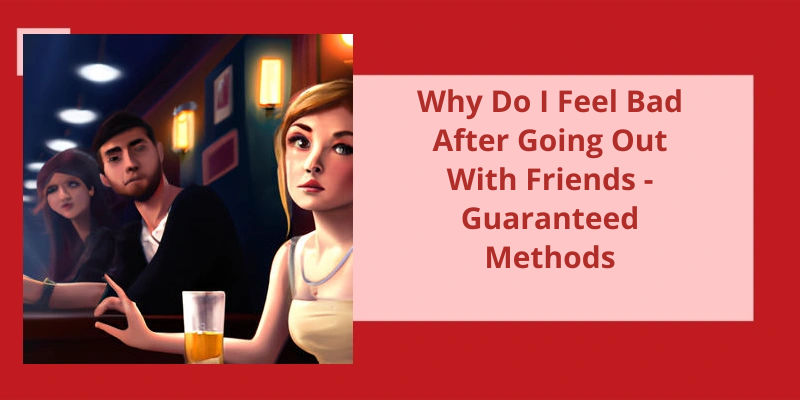Are you someone who often finds themselves feeling down or even worse after spending time with friends? You're not alone. It's a curious phenomenon that many individuals experience but rarely discuss openly. While socializing with friends should typically leave us feeling uplifted and rejuvenated, there are times when we come home feeling inexplicably sad, drained, or even slightly empty. But what could be the cause of these post-socializing blues? Perhaps it's the pressure to conform to societal expectations or the fear of missing out on other opportunities. It could also be due to a misalignment of personal values or a lack of genuine connection with our friends. Regardless of the reason, it's essential to recognize and address this issue, as it can significantly impact our overall well-being and hinder future social interactions. This blog aims to delve into the root causes of feeling bad after going out with friends and provide guaranteed methods to counteract these negative emotions, ensuring more fulfilling and positive experiences in our social lives.
Are Friends Supposed to Make You Feel Bad About Yourself?
Are friends supposed to make you feel bad about yourself? It’s a question that often plagues our minds when we find ourselves feeling down after spending time with them. While it’s difficult to analyze their behavior, our emotions never lie. Friends should ideally make us feel good, empowered, and uplifted, leaving us with a sense of joy and fulfillment. However, if we consistently leave their company feeling like crap, it might be time to re-evaluate the benefits were deriving from the friendship.
Feeling bad about yourself after hanging out with friends can be a subtle indication that something isnt quite right. It’s natural to have disagreements or be occasionally irritated by our friends actions, but if this feeling persists, it could be a sign of a deeper issue. Negative self-esteem, self-doubt, or feelings of inadequacy might be triggered by the behavior or comments of certain friends. While it can be challenging to identify the exact cause, paying attention to these emotions is crucial for our overall well-being.
Sometimes, friends unknowingly create an environment that fosters negativity. They may be overly critical, judgmental, or constantly comparing themselves to others. Such behavior can slowly erode our self-confidence and leave us feeling worse about ourselves. It’s important to draw boundaries and communicate our needs to these friends, giving them an opportunity to reflect on how their words or actions impact us.
Another possibility is that weve outgrown the friendship. Over time, people change, evolve, and pursue different paths in life. Our values, interests, and goals can diverge from those of our friends. If we continually feel bad about ourselves in their presence, it might be a sign that the friendship no longer aligns with our personal growth. In such cases, it’s essential to have an honest conversation and evaluate if the relationship is still serving us positively.
Of course, it’s not always the fault of our friends. Sometimes, our own insecurities and self-critical nature can magnify any negative experiences or comments. It’s important to reflect on our own mindset and work on building self-compassion and resilience. Surrounding ourselves with supportive, uplifting individuals can also counteract any negative effects from certain friendships, ensuring a healthy balance in our social circles.
Additionally, if weve outgrown the friendship or our values have diverged, it might be time to re-evaluate and have an honest conversation. Lastly, working on our own mindset, building self-compassion, and surrounding ourselves with supportive friends can help counteract any negative effects and create a healthier social circle.
How to Set Boundaries With Friends Who Make You Feel Bad About Yourself.
- Recognize your worth and value.
- Identify the friends who make you feel bad about yourself.
- Evaluate the impact of their behavior on your well-being.
- Set clear boundaries with your friends.
- Communicate your feelings assertively.
- Avoid getting defensive or blaming yourself.
- Surround yourself with supportive and uplifting friends.
- Practice self-care and self-love.
- Seek professional help if necessary.
It’s not uncommon to feel hurt or upset when our friends unintentionally make us feel bad. Instead of immediately distancing yourself or harboring negative emotions, it can be beneficial to acknowledge the circumstances that may have influenced their behavior. By directly addressing your feelings with your friend, you create an opportunity for open and honest communication, paving the way for a resolution that strengthens your bond.
What to Do When Your Friends Make You Feel Bad?
Feeling bad after spending time with friends isn’t uncommon. At times, our friends might unintentionally say or do things that hurt us. It’s crucial to recognize that their behavior might be a result of their own struggles or unawareness of our feelings. To overcome these situations, it’s essential to understand the circumstances that led our friends to behave in ways that made us feel bad.
Open and honest communication is key when it comes to resolving such issues. Often, our friends may not even be aware of how upset we’re because they can’t read our minds. By directly expressing our feelings to them, we provide them with the opportunity to understand the impact of their actions on us. Honest conversation can lead to a more profound understanding between friends, facilitating a resolution to the issue at hand.
When approaching the conversation, it’s important to remain calm and non-confrontational. By maintaining a level-headed and empathetic demeanor, it’s more likely that our friends will be receptive to our concerns. It’s essential to approach the conversation with the intention of finding a solution together, rather than placing blame solely on one party.
Additionally, we should consider the underlying factors that may have contributed to our friends behavior. They may be dealing with personal challenges, stress, or any number of other issues that could impact their actions. Understanding their circumstances and offering empathy can help create a supportive environment for open dialogue and resolution.
Ultimately, addressing the issue directly with our friends and seeking a resolution through open communication is the best way to overcome feelings of negativity after spending time with them. By fostering understanding and empathy, we can strengthen our friendships and create a more positive and supportive social dynamic. Remember, it’s crucial to prioritize our well-being and surround ourselves with friends who genuinely care about our feelings and work towards resolving any conflicts that arise.
Setting Boundaries With Friends: How to Establish and Communicate Boundaries in Friendships to Prevent Situations That Make Us Feel Bad.
Setting boundaries with friends is crucial for maintaining healthy and fulfilling friendships. It’s important to establish and communicate these boundaries to prevent situations that may leave you feeling bad after spending time with your friends.
First, take the time to reflect on what boundaries are necessary for you. Consider your values, needs, and limits in different areas of your life, such as personal space, emotional availability, and time commitments. This self-awareness will help you establish clear boundaries.
Once you’ve identified your boundaries, communicate them openly and assertively with your friends. Let them know what’s acceptable and unacceptable to you in a respectful manner. This can include expressing your need for alone time, setting expectations for emotional support, or discussing topics that make you uncomfortable.
Remember, boundaries are a two-way street. Be open to hearing and respecting your friends’ boundaries as well. Healthy friendships involve mutual understanding and compromise.
It’s normal to feel a bit uncomfortable initially when setting boundaries. However, by doing so, you’re prioritizing your well-being and building healthier relationships. Boundaries help create a sense of safety, trust, and respect within your friendships.
If you find that certain friends consistently disregard your boundaries or make you feel bad despite your efforts, it may be worth reevaluating the balance in those relationships. Surround yourself with friends who respect and support your boundaries, and don’t be afraid to let go of toxic friendships if necessary.
Remember, setting boundaries is a sign of self-care and self-respect. It allows you to prioritize your own emotional and mental well-being, leading to healthier and more fulfilling friendships in the long run.
Conclusion
In conclusion, it isn’t uncommon to experience negative emotions after spending time with friends, even though we expect these interactions to bring us joy and fulfillment. While there can be various factors contributing to these feelings, it’s important to recognize that individual experiences differ greatly. Therefore, it’s essential to prioritize self-care and understanding one's own needs in order to maintain healthy and fulfilling relationships. By acknowledging and addressing these feelings, and making adjustments or seeking professional help if necessary, individuals can work towards cultivating positive and meaningful connections with friends that leave them feeling fulfilled and content. Ultimately, the key lies in striking a balance between socializing and taking care of oneself, ensuring that these interactions bring more joy than distress.






